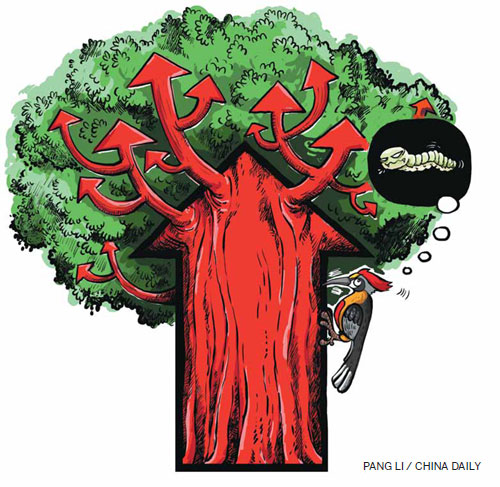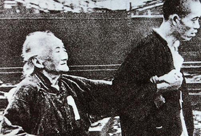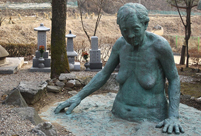 Fighters of Lanzhou MAC in confrontation training
Fighters of Lanzhou MAC in confrontation training
 3D printing to trigger third industrial revolution
3D printing to trigger third industrial revolution
 Top 10 brands that win rich women's hearts
Top 10 brands that win rich women's hearts
 Deng Xiaoping: 'I have a clear conscience all my life'
Deng Xiaoping: 'I have a clear conscience all my life'
 Xi Jinping: 'The people are our strength'
Xi Jinping: 'The people are our strength'
 Amazing cliff diving in cold winter
Amazing cliff diving in cold winter
 Enjoy Sochi 2014 in slow motion
Enjoy Sochi 2014 in slow motion
 University student sentenced to death for poisoning roommate
University student sentenced to death for poisoning roommate
 Chinese lunar New Year celebrated in San Francisco
Chinese lunar New Year celebrated in San Francisco
 |
Impact of efforts hard to assess, but benefits expected in long run
The road that runs alongside Shenjiamen port is packed with seafood restaurants that, along with the yachts that fill the marinas, dominate the view of this part of Zhoushan, an island city in Zhejiang province.
Outside each of the glass-roofed eateries, women work their beats, approaching passersby and urging, almost pleading, with them to come in and try the shrimp and clams.
It's a scene that would have been unimaginable just two years ago, before China's new leadership launched a campaign to crack down on the unauthorized use of public money and put an end to publicly funded banquets and red tape.
Before the campaign, residents said, it was almost impossible to find a table at the restaurants, a "must-see" spot for tourists, especially in the evening. When dusk fell on the port, publicly funded banquets accounted for a large part of the restaurants' business.
But the sweet days for restaurant owners are over. In late 2012, President Xi Jinping began curbing extravagant spending and discouraged overt displays of wealth, with officials banned from accepting expensive gifts and attending luxury banquets.
The impact on the once-thriving catering sector was almost immediate and was felt as keenly in Zhoushan as in other parts of the country.
The high-end West Lake Spring restaurant closed in December. Although it had operated profitably since opening in January 2010, everything turned sour in late 2012.
Few regular customers could afford the expensive dishes, and when local officials stopped dining there, trade died. Local media reported that the Zhoushan branch was the first to be closed by the restaurant chain.
The Sheraton Hotel, the most luxurious in Zhoushan, stands next to the city government offices. But trade that once boomed there is now sluggish.
In February, Starwood Hotels & Resorts Worldwide, which owns the hotel, reported fourth-quarter revenue of $1.51 billion, below analysts' estimates.

 Chaihe village, pure and peaceful fairyland in snow
Chaihe village, pure and peaceful fairyland in snow Belgians warmly welcome arrival of China's giant pandas
Belgians warmly welcome arrival of China's giant pandas Female marines receive tactical training in NW China
Female marines receive tactical training in NW China Blood memory: Nanjing Massacre in 1937
Blood memory: Nanjing Massacre in 1937 Top 10 pure beauties in showbiz
Top 10 pure beauties in showbiz British WWII veteran: I can't forgive Japan
British WWII veteran: I can't forgive Japan Tongban's dream of prosperity
Tongban's dream of prosperity Chinese frigate Yancheng holds drills in Mediterranean Sea
Chinese frigate Yancheng holds drills in Mediterranean Sea A visit to comfort woman's home in South Korea
A visit to comfort woman's home in South Korea Fairyland? Qingdao in sea of clouds
Fairyland? Qingdao in sea of clouds Top 10 most handsome faces in Asia in 2013
Top 10 most handsome faces in Asia in 2013 Female celebs with beautiful long legs
Female celebs with beautiful long legs Cat 'guardians' in Forbidden City
Cat 'guardians' in Forbidden City Large numbers of ancient coins excavated in Inner Mongolia
Large numbers of ancient coins excavated in Inner Mongolia Leisurely life beneath Zhonggulou, where time travels slower
Leisurely life beneath Zhonggulou, where time travels slowerDay|Week|Month